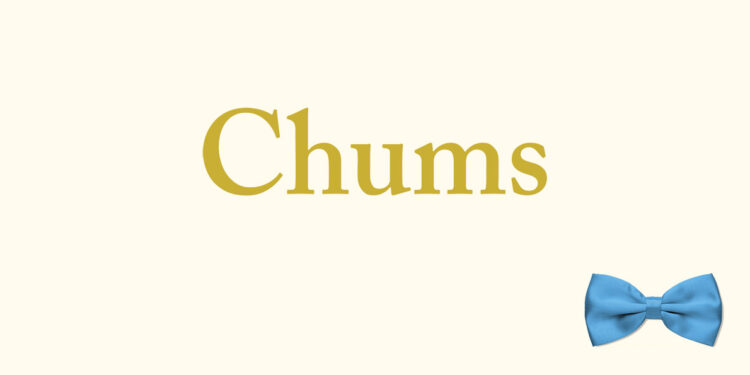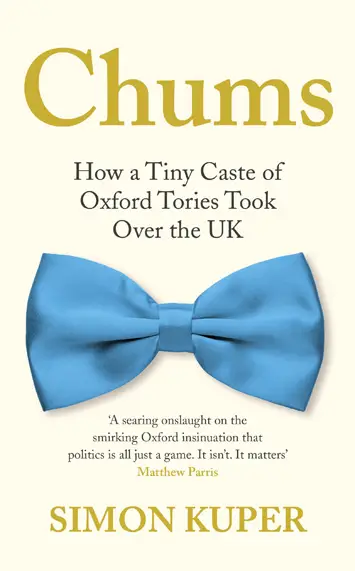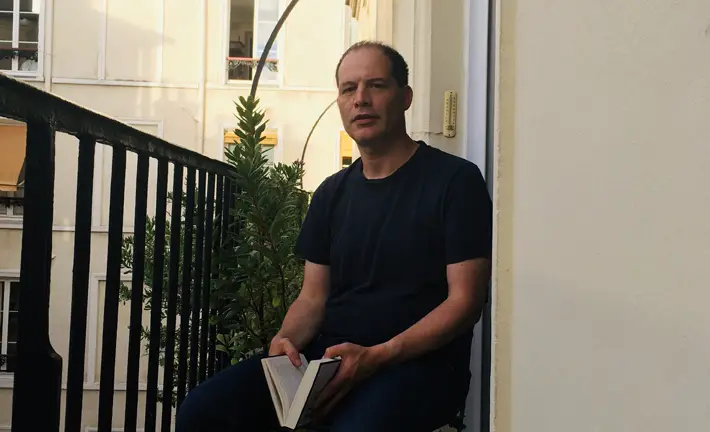Chums by Simon Kuper – Review

By Clare Jenkins
Ten pages into this insider/outsider critique of the current Conservative leadership and I was looking up ‘tumbrils’ and ‘knitting needles’ on Amazon. If anything’s going to stir up revolution and turn me into an 18th Century French tricoteuse, it’s not the Platinum Jubilee celebrations, it’s the thought of the privilege, sense of entitlement and elitism exhibited by the likes of Boris Johnson, Jacob Rees-Mogg, even the aggressively anarchic Dominic Cummings.
We already know a fair bit about their ‘rules are for little people’ attitudes. But did you know that Johnson’s page in Eton’s Leave Book of 1983 “featured a photograph of himself adorned with two scarves and a machine gun, and an inscription pledged to register ‘more notches on my phallocratic phallus’”? Well, he certainly achieved that ambition – among many others.
Did you know that members of the Bullingdon Club – to which Johnson and David Cameron both belonged – “went round in a pack sacking restaurants or the rooms of new members, smashing bottles on the street, humiliating hired sex workers, and debagging (removing the trousers of) lower-caste outsiders”?
What larks! What japes! But just you try behaving like a hooligan if your father isn’t a baronet, if you don’t live in a stately home, if you haven’t been to a posh private school, if your wife isn’t a multi-millionaire.
T’was ever thus, of course – young toffs knowing they’ll inherit the earth and being rude, mean or downright cruel to the servants (including civil ones). The 19th Century radical William Cobbett called it The Old Corruption, the Victorians talked of ‘the upper ten thousand’, while in the 1950s it became The Establishment. You might have hoped, though, that by the 21st Century, with its social movements against all forms of inequality, such rampant disparity might have been ‘levelled up’ by now. Some chance.
Kuper – himself a 1980s Oxford University graduate and now a Financial Times columnist – quotes Damian Furniss, a writer and health and social care worker, who in 1984 attended Balliol College for interview from sixth form. A working-class boy from Devon, with a stammer, a state school education and no contacts, he recalled having a drink in the college bar and being mocked by Johnson, who was surrounded by a “coterie of acolytes whose only apparent role in life was to laugh at his jokes… His piss-taking was brutal… he mocked my speech impediment, my accent, my school, my dress sense, my haircut, my background, my father’s work as a farm worker and garage proprietor, and my prospects in the scholarship interview I was there for. His only motivation was to amuse his posh boy mates.”
“Ruthlessly revealing”
Oh, come on, Damian, lighten up! Can’t you take a joke? Everyone else in the UK has, after all. Many people voted for this “Biggest Man on Campus… the silverback gorilla, the alpha male”, remember? Even traditional Labour voters in Red Wall seats – perhaps unaware that, at Oxford, he sneered at the university’s Labour Club for “retreating into their miserable dungareed caucuses.”
The great American satirist Dorothy Parker once wrote of a book she was reviewing: “This is not a book to be tossed aside lightly. It’s a book to be thrown away with great force.” The same can be said about this knife-wielding dissection of the influence of Oxford (and its Union) on the British ruling class and its ‘chumocracy’. Not because it’s not good – it’s excellent, powerful and full of ruthlessly revealing anecdotes – but because of its examination of how the odds can still be so stacked against people of talent and brains if they haven’t been born into power and riches and an acceptance of “effortless superiority”.
In the 1920s, Alec Douglas-Home left Eton for Oxford, graduated with a third and went on to become Prime Minister, “the third consecutive Etonian in the job. From 1900 to 1979, nearly a quarter of all cabinet ministers had been to Eton.” Sixty years later, the future journalist Toby Young (yes, the Oxford influence extends remorselessly into the media as well) was rejected from Brasenose College after not achieving the requisite A level grades (two Bs and a C – eat your heart out, today’s 18-year-olds). He still got in, writes Kuper, because his father – Baron Young of Dartington – phoned the admissions tutor. If only everyone had a father with clout (and a title).
Inbred self-confidence is, of course, what the likes of Johnson, Rees-Mogg (“the only undergraduate who went around in a double-breasted suit”), Rishi Sunak (Winchester) and David Cameron (whose “accent, confidence, height and pink rude health always screamed Eton”) have in spades. As do less recognisable but very influential players, like ardent Brexiteer Daniel (now Baron) Hannan, co-founder of the Vote Leave campaign. They’re gifted it by fairy godmothers, then have it nurtured at Eton/ Winchester/Charterhouse/Shrewsbury/wherever and honed at Oxford.
Kuper’s aim isn’t to slate Oxford and all who go there – there are many fine Oxford graduates from all backgrounds and schools, in all walks of life, treating people with respect and consideration: Balliol’s Rory Stewart for starters, with his first-hand knowledge of conflict zones and his innate apparent decency. But Oxford, Kuper argues, especially when combined with posh public schools, has traditionally created an impregnable elite. After all, of the 15 Prime Ministers since the war, 11 went to Oxford. Of the others, Churchill, Callaghan and Major didn’t go to university, and Gordon Brown went to Edinburgh.
But how, he wonders in a central theme of the book, has a “Brahmin caste”, educated at the University of Oxford “captured the British machine? And with what consequences?”
His main argument is that Brexit wouldn’t have happened without the nostalgic, guardians-of-Empire viewpoint of “the Oxocracy”.
“All the leading Oxford Tory Brexiteers,” he states, “studied backward-looking subjects: classics for Johnson, history for Rees-Mogg and Hannan, and ancient and modern history for Cummings. [Michael] Gove’s degree was English, which mostly meant the canon.”
David Cameron, on the other hand, studied Philosophy, Politics and Economics (PPE) – which still didn’t alert this keen Remainer to the fact that calling a Referendum on the EU was his fatal mistake.
Cameron, like many of his colleagues, had honed his public speaking and debating skills in the Oxford Union, of which Boris Johnson was once president. At university, the latter “turned self-parody into a form of self-promotion… [He] merged three archetypes from British popular culture: Brideshead, Wooster and the boarding-school bounder. The bounder is the rogue of his school, who doesn’t do his ‘prep’, smokes behind the rugger field, breaks bounds, romances girls and is always getting into ‘scrapes’. In adulthood, bounders traditionally end up hiding from their creditors in Australia.”
If only.
As with Rees-Mogg’s Lord Snooty brand, such people can initially be regarded with amused tolerance, as “the mad relatives you shut up in the attic”. By the time you realise they’ve not only escaped across the rooftops but have locked you in instead and taken the key, it’s too late.
“Seriously wounded”
 In one powerfully poignant chapter, Kuper examines a major difference between Johnson and his hero Churchill: peacetime vs wartime. As well as overseeing the running (and winding up) of the British Empire, Churchill was nearly killed on the Belgian front during the First World War. His immediate predecessor, Clement Attlee, fought at Gallipoli and was wounded by shrapnel as he ran ahead of his troops in Mesopotamia. Churchill’s successor, Anthony Eden, won a Military Cross “for carrying back a wounded sergeant from no-man’s land under German fire. Two of his three brothers died in the war, as did a third of his class from Eton.” Harold Macmillan, who succeeded Eden, was seriously wounded three times, and later reflected that time in the trenches brought him into the closest of contacts with men from very different socio-economic backgrounds.
In one powerfully poignant chapter, Kuper examines a major difference between Johnson and his hero Churchill: peacetime vs wartime. As well as overseeing the running (and winding up) of the British Empire, Churchill was nearly killed on the Belgian front during the First World War. His immediate predecessor, Clement Attlee, fought at Gallipoli and was wounded by shrapnel as he ran ahead of his troops in Mesopotamia. Churchill’s successor, Anthony Eden, won a Military Cross “for carrying back a wounded sergeant from no-man’s land under German fire. Two of his three brothers died in the war, as did a third of his class from Eton.” Harold Macmillan, who succeeded Eden, was seriously wounded three times, and later reflected that time in the trenches brought him into the closest of contacts with men from very different socio-economic backgrounds.
During the Second World War, Edward Heath was mentioned in dispatches and awarded an MBE for active service in the Normandy landings. “He said later that seeing Europe destroy itself again left him ‘with the deep belief that remains with me to this day: that the peoples of Europe must never again be allowed to fight each other’. In 1973, he took the UK into the EEC.”
Fifteen years later, however, while many of those now in power were still at Oxford, Margaret Thatcher was warning of “a European superstate exercising new dominance”. Robbed of the chance to be wartime heroes, angered by Europe’s dominance over their sceptred isle, these latter-day Woosters hit on Brexit as a means of re-establishing their own superiority: “Ruling Britain was the prerogative of their caste. They didn’t want outsiders in Brussels muscling in. Tory ‘Euroscepticism’ began as part of a jobs protection scheme, much like taxi drivers fighting back against Uber.”
Brexit, writes Kuper, would come to give the Oxford Tory politicians “a chance to live in interesting times, as their ancestors had. It would raise the tediously low stakes of British politics. It would be a glorious romantic act, like the Charge of the Light Brigade, only with less personal risk.”
After all, “If your life passage has taken you from medieval rural home to medieval boarding school to medieval Oxford college, and finally to medieval parliament, you inevitably end up thinking: ‘What could possibly go wrong?’ If Brexit didn’t work out, the Oxford Tories could always just set up new investment vehicles inside the EU, like Rees-Mogg, or apply for European passports, like Stanley Johnson.”
And so Boris Johnson could seduce the country with populist falsehoods about curbing immigration and having an extra £350 million a week to give to the NHS. In fact, argues Kuper, “the ‘very, very bright future’ that he saw for post-Brexit Britain applied in spades [only] to himself.”
Post-Brexit, of course, came the pandemic – and another opportunity for the Oxford Torysphere to stick together, giving their chums PPE and NHS outsourcing contracts or roles heading up the NHS Test and Trace programme, the Vaccine Taskforce and (illegally, as two judges later ruled) the National Institute for Health Protection; giving them jobs as Anti-Corruption Champions and well-paid aides and comms directors; installing them on Advisory Boards for this and that. Forget Marxist cries of class solidarity – what’s really important is upper-class solidarity.
But what to do about it? Well, Kuper argues a) that Oxford could become a postgraduate research institute only, or b) that both it and Cambridge could become more rigorous meritocracies (which the latter at least would say it already is). “What about retraining gifted but under-qualified adults, or expanding their summer schools for promising disadvantaged teenagers? Oxbridge for all could raise lots of people’s sights. Rather than getting rid of Oxbridge’s excellence, we could spread it much more widely.”
Other universities, of course, could argue that they are also centres of excellence, in both different subjects and similar ones. “Alternatively,” Kuper concludes, “we could preserve Oxford unchanged, and just accept elite self-perpetuation as the intended outcome of British life.”
Running the country or ruining the country? Tell me when it’s time to get out the knitting needles.
‘Chums; How a Tiny Caste of Oxford Tories Took Over the UK’ by Simon Kuper is published by Profile Books, £16.99 hardback










